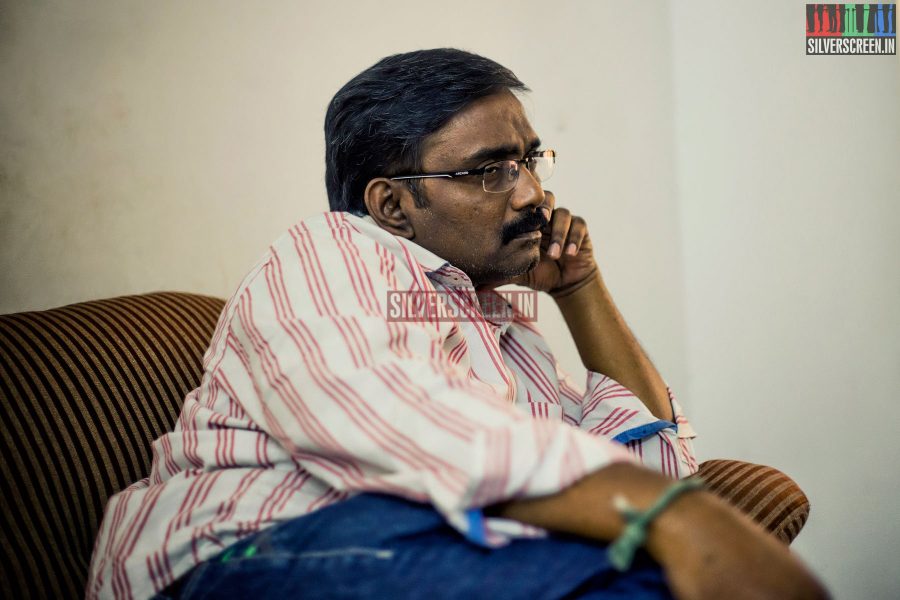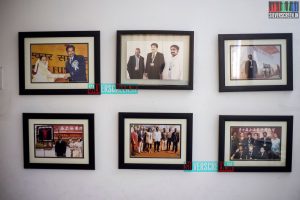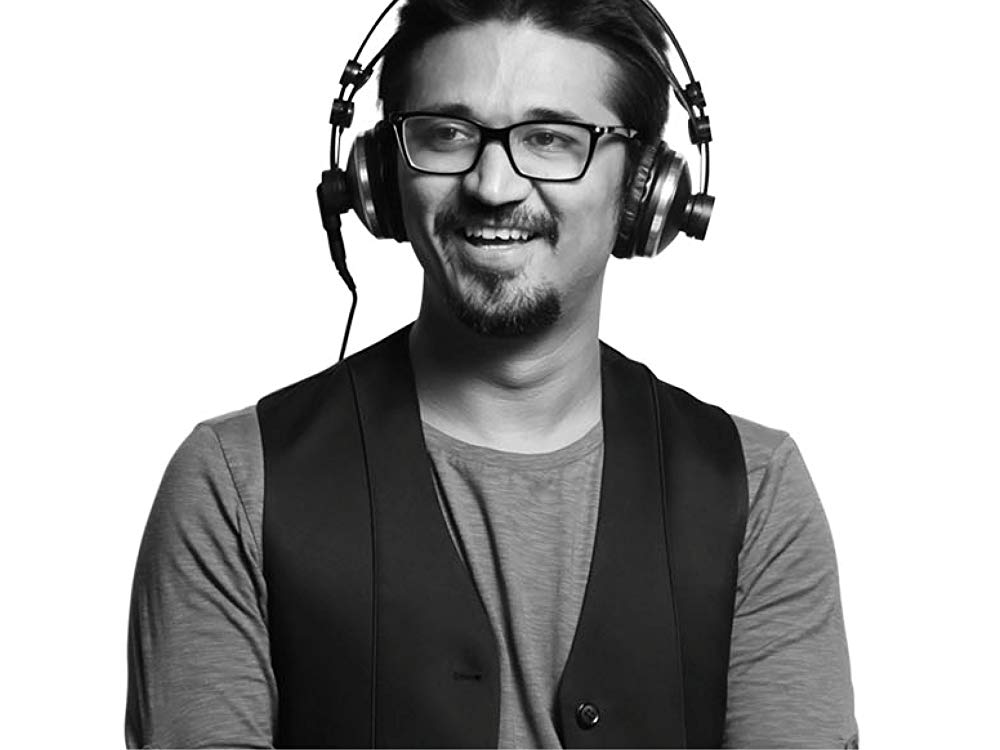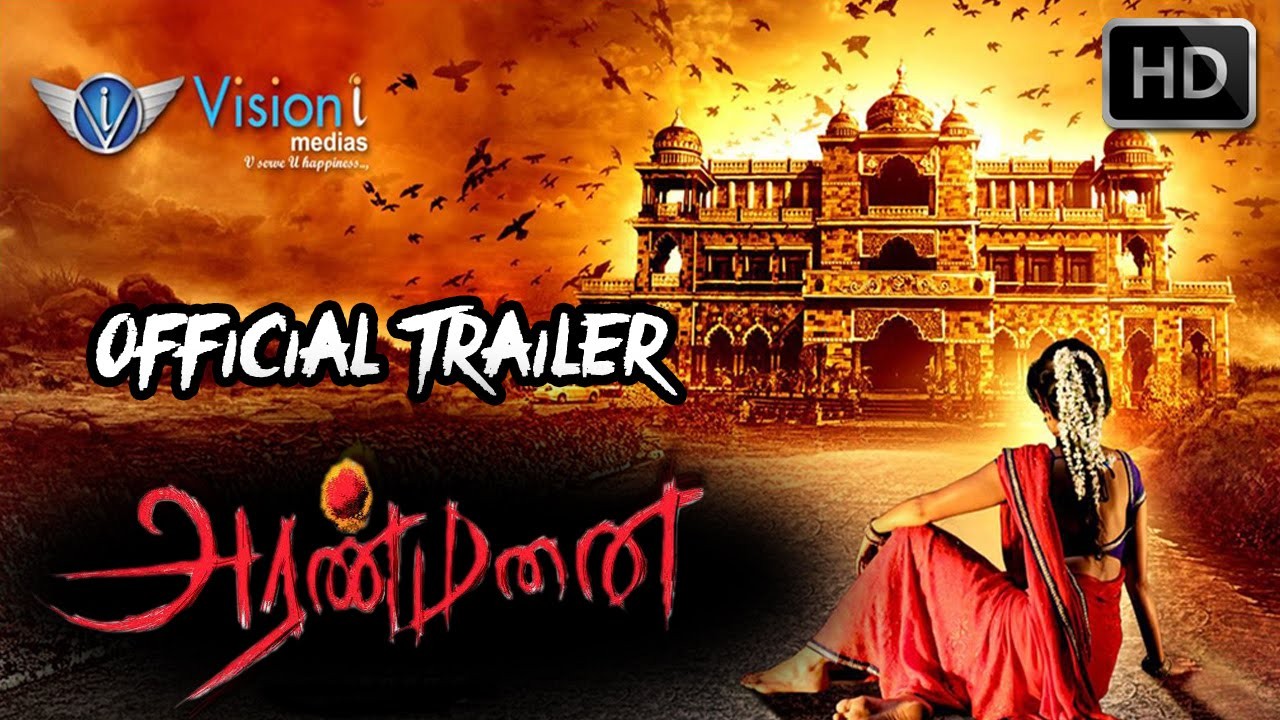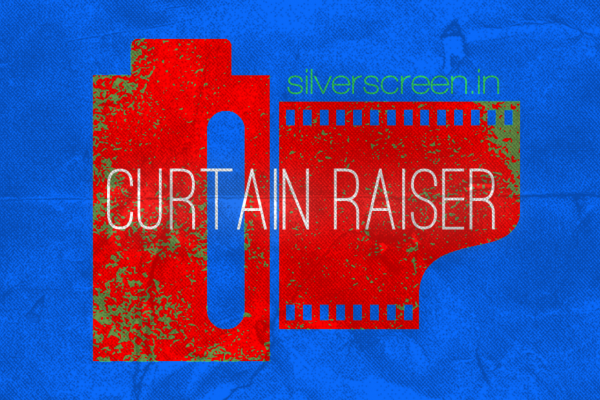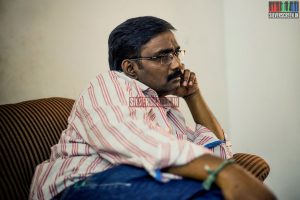
Director Vasantha Balan Exclusive Interview with Silverscreen.in
One of those evenings, Vasanthabalan, along with his parents, found himself visiting a potential bride – a traditional Tamil ceremony, held amidst some heavy snacking.
A formal round of introductions was made.
Her name was Viji.
Vasanthabalan vividly recalls his mother leaning over to whisper to him, “Isn’t that the name of your heroine in Album?”
Seri kalyanam pannikkaren nu sollitten.
He laughs at the memory now.
Soon after that little event, Vasanthabalan married Vijaya Lakshmi.
Accidental, he says. That’s how life is. He’d never given the name much thought earlier; not even when he had to christen one of the key characters in his first movie several years ago.
Aana ippo, eppapaaru Viji Viji nu kooptute irukken. Life epdi iruku patheengala?
*****
I schedule an appointment with him a few days before the release of his latest, and perhaps biggest venture, Kaaviya Thalaivan.
An auto-stand marks the street housing his office in KK Nagar. I walk up to a guy perched on the driver’s seat, browsing intently through a newspaper.
Vasanthabalan’s office?
He points straight ahead without looking up.
First floor. Ippo thaan nadandhu ponaaru.
Vasanthabalan’s office is remarkably quiet. There’s no sign of activity, no indication whatsoever that the director is at the helm of one of the most anticipated movies of the year. Not a single poster, nothing discernible to the eye, anyway.
He ushers me into his sitting room, above a spiral staircase. And here, I see the first signs of life. A few trophies, and a singular line of photos. Almost all of them shot abroad; one from Cannes.
He offers me a seat.
*****
Virudhunagar, a small town in Tamil Nadu situated 53 kms south of Madurai, was where Vasanthabalan spent much of his childhood. He was called Bala Murugan then. A studious lad, brilliant at school, who’d harboured no more desire than to become a government employee like his father. Bala Murugan loved to write, though. He was quite fond of poems, lyrical ballads, and penning little stories.
Cinema was “accidental”, he employs the word again. All that the young Bala Murugan had wanted to do, was to “work for the press” at best.
He also used to read a lot. Balakumaran, Sujatha, Jayakanthan, Jayamohan, Sundara Ramasami…
When he finished college, Bala Murugan left Virudhunagar for the big city. “You feel a little insecure,” he explains, “when you leave your hometown for a place like Chennai.” And that formed the crux of the story for his 2010 movie Angadi Theru – a tale set in the busy Ranganathan street – following the life of a small-town boy who comes to the city to work. “That movie is based on my experiences. 70 percent perhaps?”
He mentions a few instances. The scene where Lingam calls his mother back at his village, with promises of sending money. Another where he gets fired… “I cried when I was thrown out of work, I have lived in cramped spaces before I managed to get decent accommodation. Those are the things that I have portrayed in the movie.”
Album, on the other hand, his very first release in 2002, was more about the regular life of a small-town lad. With newcomers Aryan and Srutika in the lead, it became famous for one its songs, Chellame Chellam, which marked the debut of singer Shreya Ghoshal in Tamil. The film was a commercial failure, though.
Cycle kathukarapodhu keezha vizhuvom la? Apdi thaan. Enna vechu ezhudina kadhai. Adhu almost ennoda real life story.
“It was about a small-town boy’s ideologies. He’s a communist, and he falls in love with this girl.”
Album wasn’t shot in Virudhunagar though. It was filmed in the equally sedate Tenkasi, a favourite haunt where (among other places) Vasanthabalan would shoot his Kaaviya Thalaivan as well.
He had rechristened himself by now. To enter the world of cinema. An identity that brought along a piece of home. He fashioned a cinema-worthy name by simply prefixing his mother’s name to his. After all, he was ‘Vasanthabalan’ right from the moment he was born, even before he’d been given a name.
Enga amma peru enakke vechukitten, he chuckles. Padathula innum illa.
His son, on the other hand, was named after Vasanthabalan’s father.
Guru Prajyan.
*****

Director Vasantha Balan Exclusive Interview with Silverscreen.in
He was just 21 then, hugely inspired by K Balachander and Bharathiraja. Sindhu Bhairavi, Aval Oru Thodarkadhai, Manadhil Urudhi Vendum were favourites.
Aana, cinema paththi onnume theriyaadhu. Ellam pudhusa irunduchu.
At “office”, he would have to copy and file scripts. And at the spot, he would have to mark the beginning of a scene with a clap-board. He would also suggest ideas.
I ask him for a few instances.
“Secret,” he says mysteriously.
Shankar sir Balan idhu sonnaan nu sollanum. Ennala epdi solla mudiyum?
Gentleman, Kaadhalan, Indian, Jeans – four movies with Shankar – and four years later, Album happened.
It was also around the time when he stopped writing. Something which he regrets to this day.
*****
I have grown over the years, Balan suddenly announces. “More mature, perhaps?” During the filming of Album, he remembers being very anxious. “But while shooting Veyyil, I was ferocious,” he declares.
Nariya atrocity pannirukken. Nenachadhu nadakkanum. Kaatu kaththal kathuven.
“After Veyyil, I calmed down. And for Aravaan, I was fully equipped. During Kaaviya Thalaivan, I was quiet; my working style was different with every project. It probably had something to do with the fact that I was aging.”
Kaaviya Thalaivan was a breeze, he explains. First, it had experienced hands. “I would never have to do any work on the spot. I just had to narrate the scenes, and the actors would do it. That’s the difference between working with debutants and experienced actors. I finished this movie soon. In 80 days.”
The film was born out of a conversation with writer Jayamohan, who has penned dialogues. “I didn’t want to make Kaaviya Thalaivan initially. Only because it was a period film, and I thought it would be a little too soon – after Aravaan.” But Jayamohan’s interesting anecdotes about theatre during the pre-independence era kept him awake many nights. “I was listening to tale after tale. Apparently during those days, Ramar Pattabhishekam used to be the last act for a show. And to announce to the audience that the troupe would be moving to another town – that this was their last performance – they would demolish the sets while the last scene is being enacted. It was also considered a way of warding off the evil eye. Drishti.”
There were also other first-hand accounts about clowns being tied to poles to prevent them from joining another troupe; a tale about a pregnant woman who fell and lost her life when she saw an actor dressed as Saniswaran emerge from a river, and other instances.
“It is colourful,” Vasanthabalan says.
Kaaviya Thalaivan seems to have sparked a sudden eloquence in him.
“Reality is boring,” he adds.
Karpanai ku ettadha kathapaathirama irukkanum.
Then, without warning, I hear a poem.
Un kangal irukinddradhu
Maankalin kangalai pol irukkindradhu
“Tell me, can a man say this to a woman with a straight face today? It is a dreamy poem. But it cannot happen in real life.”
He cites another example.
En vaalukku mun nindru en velukku nigar nindru
Ennai vendru, ennai aala varum yaar andha manmadhan sakiye yaar andha manmadha sakiye
“This is a dialogue in the movie. And it cannot happen between a couple today. But it can happen in a period drama.”
*****
 Kaaviya Thalaivan is set between the real and the imaginary, Vasanthabalan declares. “Visually, it is beautiful. On one side, you have some real people and emotions, and on the other, you have their on-stage persona. What connects those two worlds?”
Kaaviya Thalaivan is set between the real and the imaginary, Vasanthabalan declares. “Visually, it is beautiful. On one side, you have some real people and emotions, and on the other, you have their on-stage persona. What connects those two worlds?”
Ramana nadikaravan, neja vazhkaila Raavanana irupaan. Aakroshamana Soorapadhman saadharanama iruppaan.Odambu muzhukka saayam poosikittu ivunga panra attakasam bayangarama irukkum.
“Also, they look beautiful; they command respect – as Arjunan or Lakshmanan – in their costumes. Our stills are lovely.”
The film is based on the autobiography of TK Shanmugam or ‘Avvai’ Shanmugam – Enadhu Nadaga Vaazhkai. “It is about how he entered theatre and his experiences. We have based certain scenes on that.”
Also, Vedhika’s character – Vadivambal – in the movie draws instances from the life of the legendary KP Sundarambal. “It is not biographical though,” Vasanthabalan clarifies, “she was in love with Kittappa, and wrote many letters to him. Later, he died and she lived in his memory. We have included some lines from those letters in the movie.”
Constructing the sets for the movie proved to be a task unto itself. They had to build a nadaga kottagai. “There were references available on the net. Also, for the drama notices, we referred to some of the originals that we found at Roja Muthiah research library in Adyar.” Almost a crore was spent on CG effects; converting tar roads to mud roads, and wiping out electrical cables, cell phone towers and airplanes from the footage.
Costumes and make-up proved tedious, too. “We had to create Duryodhanan, Murugan, Valli and purana kathapaathirangal from scratch. They all demand different wigs and crowns.”
A lot of research went into every frame, Vasanthabalan explains. “For instance, I found that period films were always tinted red. The colour is enhanced in those movies. So in KT, I made it a point to include something red in every frame. It would be a cloth hanging in the background, an object, a sari…you can notice only if you observe closely. But it would be there in almost every scene.”
Naming characters was no mean task, either. Siddharth plays Thalaivankottai Kaliappa Bhagavathar – a character so named because it had to be something similar to Shenkottai Gangathara Aiyer Kitappa, while Vadivambal matched the ageless Sundarambal.
*****
Pongal in Vasanthabalan’s Virudhunagar would be celebrated amidst a reel of drama(s). Valli Thirumanam is something he recalls instantly. There were also a handful of SV Shekar and RS Manoharan stage performances that he has watched.
“I have acted in a drama, too,” he grins. “During the aandu vizha in school. Vaadhyar vesham.”
*****
Naming is an exhaustive process in Vasanthabalan’s most recent projects. If he comes across an interesting name, he immediately writes it down in his book. And finally, he would choose the one that is most “peculiar”. “For Angadi Theru, I browsed through voter ids of several residents of Tirunelveli. I found that a lot of them were named Sermakani. It is their kuladeivam. So I named the female lead Kani. Lingam is also a common name there. So the hero was called Lingu.”
In Veyyil though, Thankam and Meenakshi were named after his athais.
Summa avanga peru vekkanum nu thonichu.
*****
There would be at least one distinctive feature in every Vasanthabalan film. In Aravaan, it was the wide 18th century landscape, and in contrast, Angadi Theru was always brimming with people. In Kaaviya Thalaivan, he says, there are quite a few lengthy shots. “We finished scenes in a long shot, with minimal cuts. One of Prithiviraj’s scenes is 7-minutes long.”
*****
[dropcap]V[/dropcap]asanthabalan’s brother is perhaps his best critic, yet. He says so himself.
Enga family la ellam mosamanavanga. Vimarsanama oru vaarthai thaan solluvanga.
“But my brother would say, ‘yen ya serious a padam panra? Singam 2, Kalakalappu nu jollya padam edu’.”
His wife, on the other hand, wants him to make a movie with Vijay, with some kuthu paatu. “My genre is alternative. Not many like it. My family is no different, they want only commercial fare. They want me to earn a lot.”
Recommended
What would Rudhraiya’s wife have said? Vasanthabalan asks suddenly. “What would K Balachander’s wife have said when he roped in Nagesh for Neer Kumizhi instead of Sivaji Ganesan or MGR? I watch a lot of world cinema. So my dreams are different from theirs. When I began reading Kumudham and Ananda Vikatan, my folks went silent, when I started reading Balakumaran, they thought I was taking the wrong route. And when I joined cinema, they lost hope.”
Ippo thaan konjam belief vandhurukku.
He then poses a rhetorical question.
“Chennai Kadhal and Veyyil released on the same day. Angadi Theru and Payya released on the same day. Which movies are remembered today?”
*****
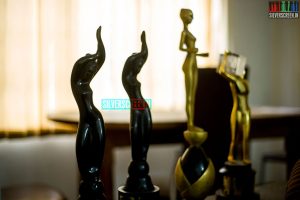 Cannes was truly a happy place, Vasanthabalan says. His Veyyil, which was the first Tamil film to be screened at the festival, was well-appreciated. “Here no matter what I do, I always receive criticism. It has to reach every audience – B, C, A. It is very tough to survive here. Recently, an artist had organized a showing of Veyyil in Paris. I had gone there. And a girl came up to me and cried. The pain is still relevant. Even after eight years.”
Cannes was truly a happy place, Vasanthabalan says. His Veyyil, which was the first Tamil film to be screened at the festival, was well-appreciated. “Here no matter what I do, I always receive criticism. It has to reach every audience – B, C, A. It is very tough to survive here. Recently, an artist had organized a showing of Veyyil in Paris. I had gone there. And a girl came up to me and cried. The pain is still relevant. Even after eight years.”
“But I never thought I would go to Cannes,” he reveals. “It has been 22 years since I set foot in Chennai. If I ask myself, ‘what have I done here during those years?’, I can say I have a National Award, a Cannes screening, and a couple of Filmfares to my credit. It might not be as great as Kamal sir’s two dozen Filmfares. But that’s still something, isn’t it?”
Kaaviya Thalaivan releases tomorrow.
*****
The Vasanthabalan interview is a Silverscreen exclusive.
